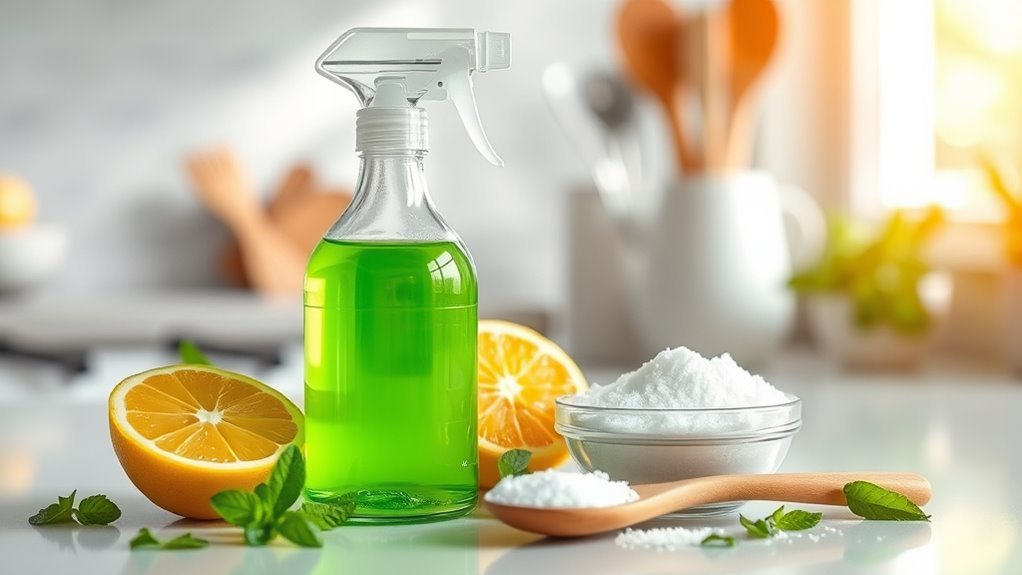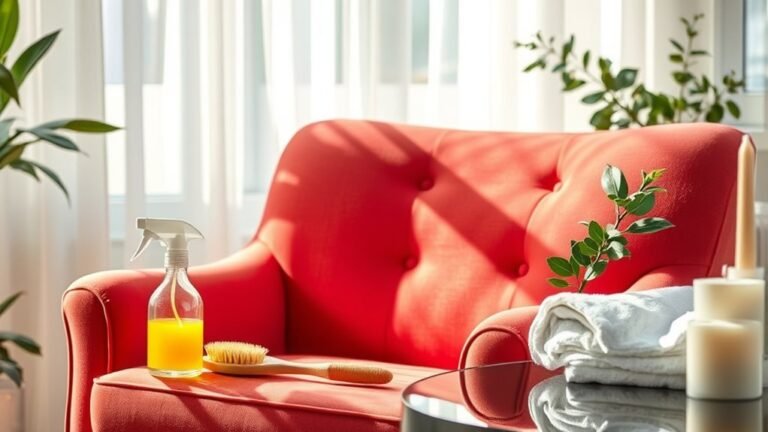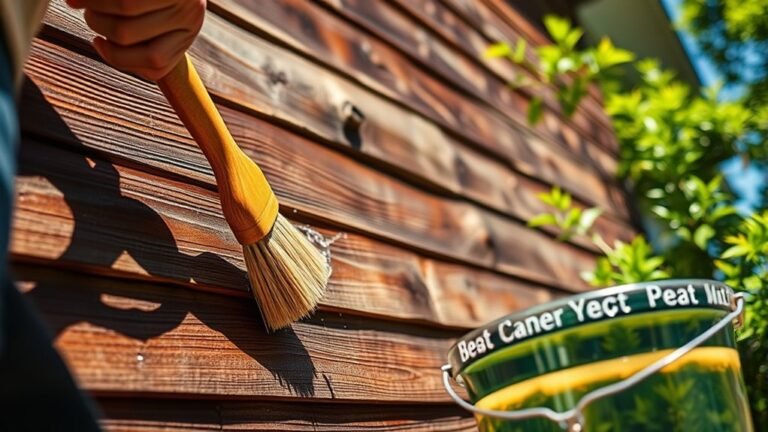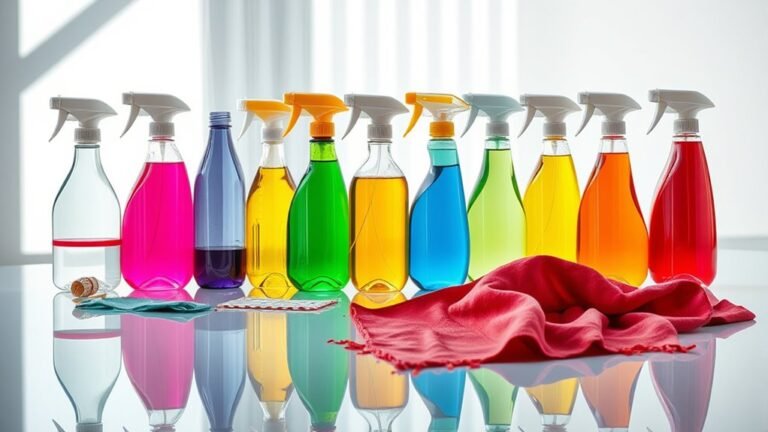DIY Cleaner for Kitchen
You can easily make a safe, chemical-free DIY kitchen cleaner using common ingredients like vinegar, baking soda, and lemon juice. Mix equal parts water and white vinegar, add lemon juice for extra freshness, and use it on counters and sinks. For grease, try a vinegar-water spray or baking soda paste. You can also make disinfectant sprays with rubbing alcohol and essential oils for added protection. Keep these tips in mind, and you’ll discover many more simple cleaning solutions.
Essential Ingredients for Homemade Kitchen Cleaners

When making your own kitchen cleaner, you’ll want to gather a few essential ingredients that are both effective and safe. Vinegar is a must-have, thanks to its incredible vinegar benefits—it naturally cuts through grease and kills bacteria without harsh chemicals. Pair it with baking soda, a versatile powerhouse that tackles stains and deodorizes surfaces. Together, these two ingredients give you freedom from commercial cleaners filled with unknown additives. You can trust in their natural cleaning power to keep your kitchen fresh and spotless. By choosing these basics, you’re not just saving money; you’re embracing a cleaner lifestyle that respects your home and the environment. Simple, accessible, and reliable—these ingredients form the backbone of any homemade kitchen cleaner you’ll ever need.
How to Make an All-Purpose Kitchen Cleaner
Now that you have your basic ingredients like vinegar and baking soda, making an all-purpose kitchen cleaner is straightforward and quick. Combine one cup of water with one cup of white vinegar to harness vinegar benefits like natural antibacterial action and deodorizing power. Add a tablespoon of lemon juice to introduce lemon power, which cuts through grime and leaves a fresh scent. Pour this mixture into a spray bottle, shake well, and it’s ready to use on countertops, sinks, and appliances. You’ll enjoy a cleaner kitchen without harsh chemicals, giving you the freedom to maintain your space safely and effectively. Just remember to avoid using it on natural stone surfaces, as vinegar can cause damage there. Simple, natural, and effective—just the way you like it.
Natural Solutions for Tackling Grease and Stains

Although grease and stains can be stubborn in the kitchen, you don’t need harsh chemicals to tackle them. You can rely on natural solutions that offer effective grease removal and stain treatment without compromising your freedom from toxins. For quick grease removal, mix equal parts white vinegar and water in a spray bottle; spray, let it sit a few minutes, then wipe clean. Baking soda is your go-to for stain treatment—sprinkle it on greasy spots, add a little water to form a paste, and gently scrub. Lemon juice also works wonders, breaking down grease and brightening stains naturally. These simple ingredients empower you to maintain a spotless kitchen while staying true to a natural, chemical-free lifestyle.
DIY Disinfectant Sprays for Kitchen Surfaces
Since kitchens are hotspots for germs, having an effective disinfectant spray on hand is essential for keeping surfaces safe and clean. You can easily make a homemade disinfectant using simple ingredients like white vinegar, rubbing alcohol, and essential oils. This DIY spray offers powerful surface sanitization without relying on harsh chemicals. Just mix equal parts rubbing alcohol and water, add a few drops of tea tree or lemon essential oil, and pour it into a spray bottle. When you want to freshen up counters, cutting boards, or appliances, just spray and wipe. This approach gives you the freedom to control what touches your kitchen surfaces while maintaining a germ-free environment. Plus, it’s budget-friendly and eco-conscious, making it a smart choice for any kitchen.
Tips for Safe and Effective Use of DIY Cleaners

Keeping your kitchen clean with DIY disinfectant sprays is a great start, but using these homemade cleaners safely will guarantee they work effectively without causing harm. To enjoy both freedom and cleaning safety, follow these tips:
- Label all DIY cleaner containers clearly to avoid confusion and accidental misuse.
- Store ingredients and finished products out of reach of children and pets to prevent ingestion or spills.
- Test your cleaner on a small, hidden surface first to verify it won’t damage countertops or appliances.
- Avoid mixing incompatible ingredients like vinegar and bleach, which can release toxic fumes.
Frequently Asked Questions
Can DIY Cleaners Damage Stainless Steel Appliances?
You might worry if DIY cleaners can damage your stainless steel appliances, but with proper stainless steel care, you’re safe. The key is cleaner compatibility—avoid acidic or abrasive ingredients that could dull the finish or cause discoloration. When you choose or make a cleaner, test it on a small area first. That way, you keep your freedom to customize while protecting your appliances from harm.
How Long Can Homemade Cleaners Be Stored Safely?
Did you know homemade cleaners typically have a shelf life of about one month? You’ll want to store them in airtight storage containers to keep them fresh and effective. Because these natural mixtures lack preservatives, they can lose potency or even spoil if kept too long. So, to enjoy your freedom from harsh chemicals without risks, always label your containers with the date and use your cleaner within 30 days for best results.
Are DIY Kitchen Cleaners Safe for Septic Systems?
You’ll be glad to know that homemade cleaners usually offer great septic safety since they often avoid harsh chemicals found in commercial products. When you make your own cleaners, you control what goes down the drain, reducing the risk of harming your septic system. Just be sure to keep ingredients natural and avoid excessive use of harsh acids or bleach. This way, you protect your septic system while enjoying the freedom of DIY cleaning.
Can Essential Oils Cause Allergies in Homemade Cleaners?
Like a gentle breeze that can sometimes carry pollen, essential oils can trigger allergy symptoms in some people. If you’re using them in homemade cleaners, you’ll want to be mindful because they may cause skin irritation, sneezing, or headaches. Don’t let that stop you, though—just test a small amount first and choose oils that suit your sensitivity. That way, you keep your freedom to create without unwanted reactions.
What Are Eco-Friendly Alternatives to Vinegar in Cleaners?
If you’re looking for eco-friendly alternatives to vinegar, you’ve got great options. Citrus juice, like lemon or orange, offers natural acidity that cuts grease and leaves a fresh scent. Baking soda is another powerhouse—it gently scrubs away grime and neutralizes odors without harsh chemicals. Using these ingredients lets you clean freely, knowing you’re kind to the environment and your health while keeping things sparkling clean.






